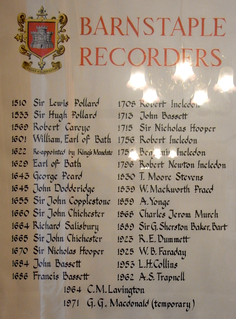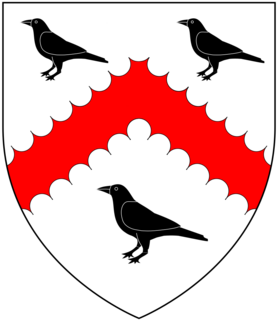Related Research Articles

Richard III was King of England and Lord of Ireland from 1483 until his death in 1485. He was the last king of the House of York and the last of the Plantagenet dynasty. His defeat and death at the Battle of Bosworth Field, the last decisive battle of the Wars of the Roses, marked the end of the Middle Ages in England. He is the protagonist of Richard III, one of William Shakespeare's history plays.

William Courtenay was Archbishop of Canterbury (1381-96), having previously been Bishop of Hereford and Bishop of London.

Lawrence Washington (1718–1752) was an Virginian soldier, planter, politician, and prominent landowner in colonial Virginia. As a founding member of the Ohio Company of Virginia, and a member of the colonial legislature representing Fairfax County, he also founded the town of Alexandria, Virginia on the banks of the Potomac River in 1749.

James Buller of Morval in Cornwall and of Downes and King's Nympton in Devon, was a Member of Parliament for East Looe in Cornwall (1741-7) and for the County of Cornwall (1748-1765). He was ancestor of the Viscounts Dilhorne and the Barons Churston and built the Palladian mansion Kings Nympton Park in Devon.

Tristram Risdon was an English antiquarian and topographer, and the author of Survey of the County of Devon. He was able to devote most of his life to writing this work. After he completed it in about 1632 it circulated around interested people in several manuscript copies for almost 80 years before it was first published by Edmund Curll in a very inferior form. A full version was not published until 1811. Risdon also collected information about genealogy and heraldry in a note-book; this was edited and published in 1897.

Mamhead is a rural village and civil parish near Dawlish and Kenton in Devon, South West England, in the Teignbridge local authority area.
William Hals (1655–1737) was a British historian who compiled a History of Cornwall, the first work of any magnitude that was printed in Cornwall. He was born at Tresawsan, in the parish of Merther in Cornwall. Much of his work was never published but was used by other Cornish historians, including Davies Gilbert, Thomas Tonkin, and John Whitaker. Some of his original work is now held by the British Library.
George Baker (1687–1772) was the Archdeacon of Totnes from 1740 until 1772.

Holcombe Burnell is a civil parish in Devon, England, the church of which is about 4 miles west of Exeter City centre. There is no village clustered around the church, rather the nearest village within the parish is Longdown. Only the manor house and two cottages are situated next to the church. The former manor house next to the church is today known as Holcombe Burnell Barton having subsequently been used as a farmhouse. The manor was in the historical Hundred of Wonford.

Lindridge House was a large 17th-century mansion, one of the finest in the south-west situated about 1 mile south of Ideford in the parish of Bishopsteignton, Devon, about 4 1/2 miles NE of Newton Abbot. It was destroyed by fire on 25 April 1963 and its ruins were finally demolished in the early 1990s, upon which was built a housing development.

Cofton is a small village, parish and former historic estate, near Dawlish in South Devon, of which parish it formed a part until 1839.
Lewis William Buck (1784–1858) of Moreton House, Bideford, and Hartland Abbey, Devon, was Member of Parliament for Exeter 1826–32 and for North Devon 1839–57, and was Sheriff of Devon in 1825/6. A full-length portrait of Lewis William Buck by Francis Grant (1803–1878) was presented to him by the people of North Devon after he had served eighteen years as their MP, now displayed in the billiards room of Hartland Abbey, with his electioneering posters on each side.
Sir Charles Crisp, 5th Baronet, or Crispe (c.1680–1740), of Dornford, Oxfordshire was an English landowner and politician, who sat in the House of Commons from 1721 to 1722.
Samuel Walker (1714–1761), called Samuel Walker of Truro, was an English evangelical clergyman of the Church of England.

The Recorder of Barnstaple was a recorder, a form of senior judicial officer, usually an experienced barrister, within the jurisdiction of the Borough of Barnstaple in Devon. He was usually a member of the local North Devonshire gentry. The position of recorder of any borough carried a great deal of prestige and power of patronage. The recorder of a borough was often entrusted by the mayor and corporation to nominate its Members of Parliament, as was the case with Sir Hugh I Pollard, Recorder of Barnstaple, who in 1545 nominated the two MP's to represent the Borough of Barnstaple. In the 19th century a recorder was the sole judge who presided at a Quarter Sessions of a Borough, a "Court of Record", and was a barrister of at least five years' standing. He fixed the dates of the Quarter Sessions at his own discretion "as long as he holds it once every quarter of a year", or more often if he deemed fit.

Richard Crocker (fl.1335) of Devon, England, was a Member of Parliament for Tavistock in Devon in 1335. His descendants were the prominent Crocker family of Crocker's Hele in the parish of Meeth, Devon, later seated at Lyneham in the parish of Yealmpton, Devon until 1740.

George Kendall (1610-1663), Doctor of Divinity, of Cofton in Devon, was a theologian.
Jamaica Dockyard also known as Port Royal Dockyard was a British Royal Navy Dockyard located at Port Royal, Jamaica. It was established 1675 and closed in 1905. The dockyard was initially administered by the Navy Board then later the Board of Admiralty.

St Brevita's Church, Lanlivery is a Grade I listed parish church in the Church of England in Lanlivery, Cornwall.

Richard Newton was an English educator and clergyman.
References
- ↑ A concise topographical history of Great Britain Vol 6 (Devon) Lysons, D; Lysons, S p209: London; Thomas Cadell; 1822
- ↑ ”Some account of the barony and town of Okehampton:Its antiquities and institutions” Bridges, W.B; Wright, W.H.K; Rattenbury, J; Shebbeare, R; Thomas, C; Fothergill, H.G Tiverton, W.Masland,1889
- ↑ Alumni Oxonienses 1500-1714 pp837867
| Church of England titles | ||
|---|---|---|
| Preceded by George Fleetwood | Archdeacon of Totnes 1713–1739 | Succeeded by George Baker |
| This article about a Church of England archdeacon in the Province of Canterbury is a stub. You can help Wikipedia by expanding it. |
